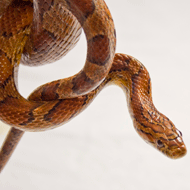Report released on exotic pet seizure

Mortality rates during the six-week "stock turnover" period were 72 per cent.
Details of one of the largest US seizures of exotic pets in US history have been published in the latest issue of the Journal of Applied Animal Welfare Science.
The authors formally investigated a major international wildlife wholesaler and later confiscated more than 26,400 animals, including 171 different species and types.
According to the paper, around 80 per cent of the nonhuman animals were grossly sick, injured or dead, with the remaining 20 per cent suspected to be in suboptimal condition.
Authors said nearly 3,500 dead or dying animals - mostly reptiles - were discarded each week, with a 72 per cent mortality rate during the six-week "stock turnover" period.
In the 10 days following confiscation, mortality rates - including euthanasia for humane reasons - were 18 per cent for invertebrates, 44.5 per cent for amphibians, 41.6 for reptiles and 5.5 per cent for mammals.
Causes of mortality included cannibalism, crushing, dehydration, emaciation, hypothermic stress, infection, parasite infestation, starvation, overcrowding and stress/injuries.
The report states contributing factors for injury and disease included poor hygiene, crowding, inadequate or inappropriate provision of food, water, heat and humidity, lack of environmental enrichment and inappropriate housing.
Authors said there was also a risk of invasive species being introduced to naive populations through escapes or pathogen spread.
UK biologist and co-author Clifford Warwick commented: "The animal dealer had operated for years with apparent impunity, largely because an amiable public facade masked the grand and sustained scale of suffering, disease and death behind the scenes.
"Unfortunately, as someone who has investigated the exotic pet trade for three decades, the conditions identified in this report are in my experience common throughout suppliers and retailers of all sizes."



 The latest
The latest